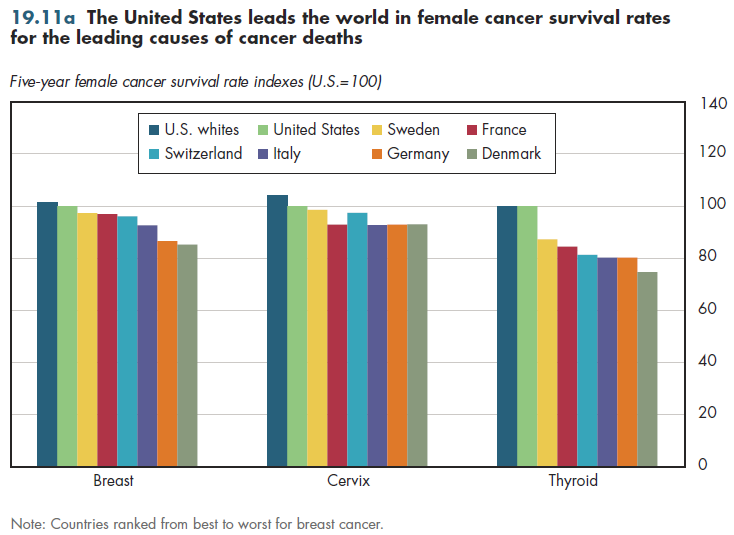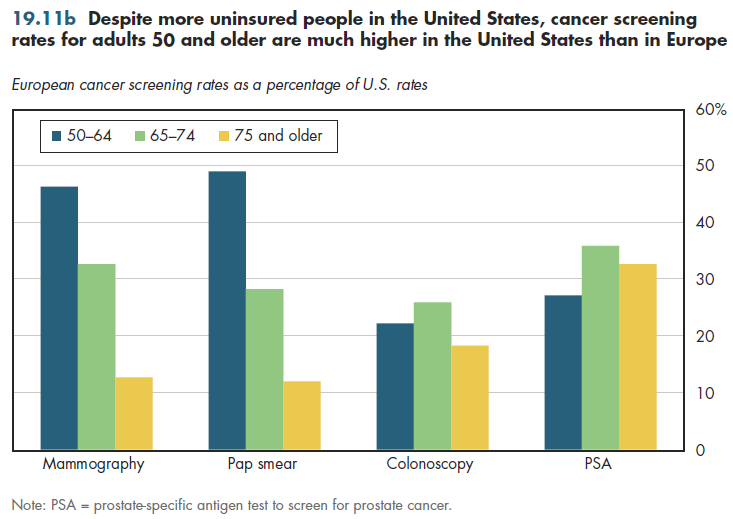Download PowerPoint versions of both figures.
Inside Collection (Book): American Health Economy Illustrated
19.11 US Cancer Patients Have Better Chances of Survival among Industrialized Nations
Summary: On average, Americans who have various types of cancer have markedly better chances of surviving five years compared with cancer patients in other industrialized nations. For several reasons, survival rates for blacks trail these averages.
Another area in which the U.S. medical system excels is in cancer treatment. Cancer patients live longer in the United States than in any other country in the world. For example, the United States leads the world in cancer survival rates for the leading cancers among women (figure 19.11a). In general, the survival differences between the United States and other countries are even greater for major cancers affecting males, including colon, lung, and prostate cancer.

For some of these cancers, such as female breast and cervical cancers, there is a large difference in survival rates for whites compared with blacks. If rates were standardized to account for the higher percentage of blacks in the United States relative to these other nations, the cancer survival differences would be even larger than shown.
Some of the apparently superior performance in the United States can be attributed to higher cancer screening rates (figure 19.11b). To the extent that cancers are detected earlier in their course through routine screening, this will increase the percentage of patients in whom cancer is detected who are able to survive five years.

The most important factors in cancer survival are early diagnosis, time to treatment, and access to the most effective drugs. Some uninsured cancer patients in the United States encounter problems with timely treatment and access. However, apparently a larger proportion of cancer patients in other G7 countries face similar barriers to access. For example, waiting times for specialty care are especially problematic in Canada and in the UK. Almost half the improvement in survival rates in the United States in the 1990s can be attributed to the introduction of new oncology drugs. Americans typically get more rapid access to new pharmaceuticals than do citizens in other countries. Consequently, any benefits from new oncology drugs would show up faster in U.S. cancer survival statistics than in countries that have longer lag-times for the introduction of the latest drugs.
Downloads
References
- Howard DH, LC Richardson and KE Thorpe. Cancer Screening and Age in the United States and Europe. Health Affairs 2009; 28(6):1838-47.
- Ohsfeldt RL and JE Schneider. How Does the U.S. Health-Care System Compare to Systems in Other Countries? In The Business of Health: How Does the U.S. Health-Care System Compare to Systems in Other Countries? American Enterprise Institute. Washington DC. 2006. http://www.aei.org/docLib/20061017_OhsfeldtSchneiderPresentation.pdf (accessed November 3, 2010).
Collection Navigation
- « Previous module in collection 19.10 US Ranks 3rd in the World in Saving Premature Infants' Lives
- Collection home: American Health Economy Illustrated
- Next module in collection » 19.12 US Has More Avoidable Deaths Amenable to Health Care among Industrialized Nations
Content actions
Give feedback:
Download:
Add:
Reuse / Edit:
Twin Cities Campus:
- © 2012 Regents of the University of Minnesota. All rights reserved.
- The University of Minnesota is an equal opportunity educator and employer. Privacy
- Last modified on Sep 24, 2013 3:47 pm -0500









